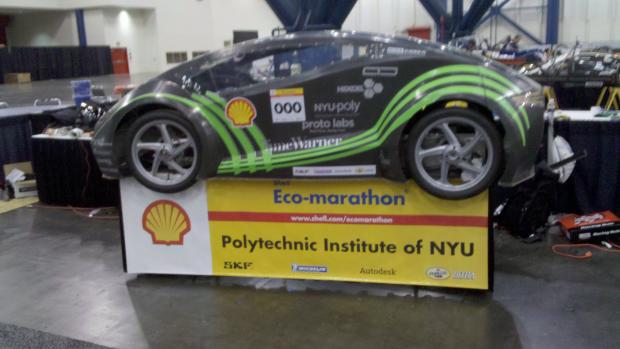Senior Design Students Compete on Land and in Air

Concept Zero, a team of mechanical engineering seniors from Polytechnic Institute of NYU, had a sleepless Saturday night in Houston following their debut at Shell Eco-marathon March 27. The annual event challenges college and high school students to design, build, and test energy-efficient vehicles. The team that goes the furthest distance using the least amount of energy wins.
After finishing their first run Saturday afternoon, Concept Zero realized that their car’s axle had shifted, their brake disk rotors were stuck, and a handful of other problems would need to be fixed before they competed the next day.
[GALLERY:3161|left]
Thanks to a trip to Home Depot and the doggedness that helped the team build its car in a few months, Concept Zero took to the track on Sunday. Team captain Michael Choi wrote in an e-mail on Saturday that he hoped to break 250 miles per gallon in the car’s UrbanConcept category (unlike the futuristic-looking Prototype-category cars that dominate Eco-marathon, UrbanConcept cars look similar to what you see on today’s roads). That hope was dashed though; the car’s best result was 144 mpg, placing the team fourth among the 10 UrbanConcept contenders (40 Prototype cars made up the rest of the pack).
Participating in Shell Eco-marathon is a victory on its own for the team, the first ever to compete from NYU-Poly. They built their car as part of Senior Design, a two-semesters-long capstone class for mechanical engineering majors. Funding from Time Warner Cable and Nordon Composites made it possible to build their car from carbon fiber.
Senior Design students conceptualize, design, fabricate, and test vehicles — from micro-planes and helicopters, to autonomous waste sorters and fuel-efficient cars — explained Joseph Borowiec, a mechanical engineering industry associate professor who taught this year’s seniors. They also have to manage budgets, be good team members, and handle many of the other challenges that come with projects closer to what they’ll face after graduation than the quizzes, tests, and papers that prepare them for their field.
Other Senior Design teams entered their projects into competitions (entering isn’t a class requirement). Team Aeronuts’ radio-controlled plane took home second place in the Advanced Class category at the SAE International Aero Design 2010 West competition March 5-7 in Van Nuys, California. The Aeronuts led the first seven rounds of competition, but, like all but one of the teams, couldn’t get their plane’s electrical system to read its take-off distance, a new requirement for the 2010 competition. Their plane did outperform in the lifting challenge. It lifted 27.7 pounds to win the Heaviest Payload Lifted Award. The team, led by Bret Shyti, contributed their success to “sturdy, simple” design.
NYU-Poly Supermileage will be the next and final Senior Design team to compete. On June 10 and 11, they’ll participate in the SAE International Supermileage competition in Marshall, Michigan. Supermileage dares engineering students to break fuel-economy records with small, four-cycle engine vehicles. This will be the first time NYU-Poly students compete in the 31-year-old competition. Team captain Yuri Shnirman says that the team wants to place in the top ten. To get there, they’re shooting for a 1,000-mpg performance.




